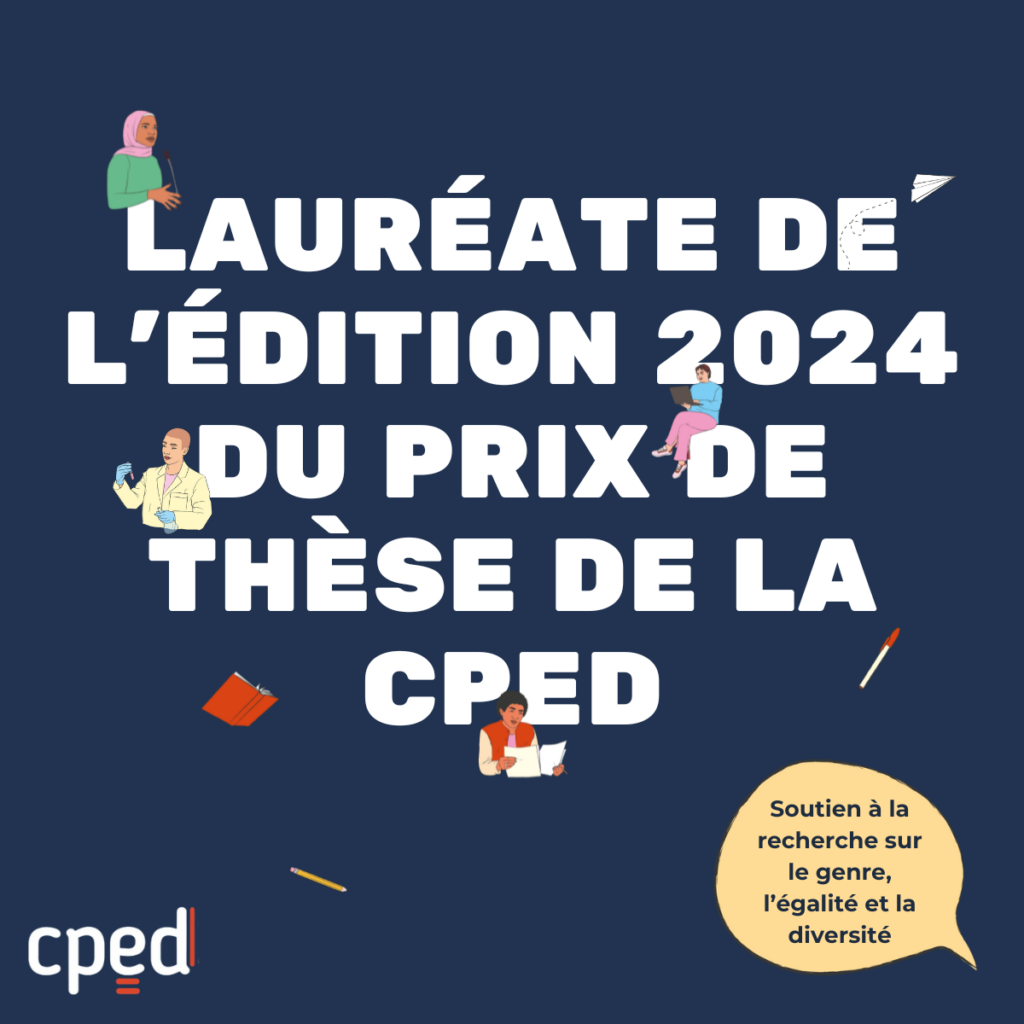Congratulations to Laura VERQUEREwinner of the CPED 2024 thesis prize, for her thesis in information and communication sciences at Sorbonne University, entitled "The fabrications of the public problem of paternity leave through a gender lens. Pour une pluralisation des modes d'être scientifiques."
It was selected from among some 50 applications from 21 CPED member establishments, and from a wide range of disciplines (educational sciences, language sciences, sociology, political sciences, linguistics, psychology, anthropology, philosophy, literature, gender studies, STAPS, religious sciences, aesthetics, arts sciences and technologies, information and communication sciences, public law, contemporary history, IT/IA, geography, epidemiology....). The jury, made up of equality and diversity officers, underlined the originality of Laura VERQUERE's work, its link with the values promoted by CPED and its multidisciplinary approach. Her analysis of the paradox between the intimate accounts of mothers and the media productions of fathers effectively demonstrates how paternity leave can contribute to the invisibility of women's work.
In addition to the €1,500 prize, the winner will be invited to present his thesis at the next CPED meetings in 2025 ! The award of this thesis prize is part of CPED's commitment to supporting research into gender, equality and diversity.

For the first edition 2024 the jury of the thesis prize was composed of :
- Catherine Minet-Letalle, former Vice President for Equality, Anti-Discrimination and VSS and Professor of Private Law at the Université du Littoral Côte d'Opale ;
- Dorothée Guérin, Vice-Chairwoman for Gender Equality and the Fight against SGBV and Professor of Private Law at the Université de Bretagne Occidentale - Brest;
- Pascal Tisserant, EDI Vice-Chairman and Senior Lecturer in Social Psychology, Université de Lorraine - Metz;
- Françoise Le Fichant, Vice President Social Responsibility and lecturer in private law at the University of Nantes;
- Véronique Van De Bor, Vice-President, Social Policy, Equality and Diversity, and researcher in developmental biology at the Université Côte d'Azur ;
- Anne Schneider, Head of Gender Equality and Anti-Discrimination at INSPE Normandie-Caen and lecturer in French literature and language at the University of Caen;
- Stefania Marcassa, Gender Equality Officer and lecturer in economics at CY Cergy Paris Université ;
- Sandrine Vaton, Women and Men Equality Referent and Director of the Engineering and Digital Sciences doctoral school at ITM Atlantique;
- Clotilde Coron, EDI Vice-President and Professor of Management Sciences at Université Paris-Saclay;
- Ingrid Colleau, gender equality coordinator at Institut Mines-Télécom;
Summary of the winning thesis:
"This dissertation in information and communication sciences looks at the fabrications of the public issue of paternity leave, which emerged in November 2017 and culminated, in September 2020, in a change in the law. The duration of paternity leave was increased from fourteen days to twenty-eight days. This research is based on a field survey conducted among the entrepreneurs.ses de cause de l'allongement du congé paternité - three feminist associations and collectives (PA.F, Parents & Féministes and ParentEgalité) and a group of ten fathers - and a semio-discursive analysis of media representations of these mobilizations in the so-called "reference" media and the women's press. The study follows the construction of the cause behind the scenes, examining the transition from the intimate experiences of parenthood of the actors involved, to their commitment and the ways in which they appear in the public arena. Through a "composite" method, paying attention to experiences, practices, discourses and representations, we reveal the plural gender dynamics that run through the constitution and mediatization of this public issue. In this way, we show how the fabrications of the public issue of paternity leave - a cause associated with issues of gender equality - paradoxically reproduce gendered power relations at both symbolic and material levels. This thesis lies at the crossroads of feminist epistemologies (care and situated knowledge), pragmatic approaches to public problems and the study of media in CIS".
